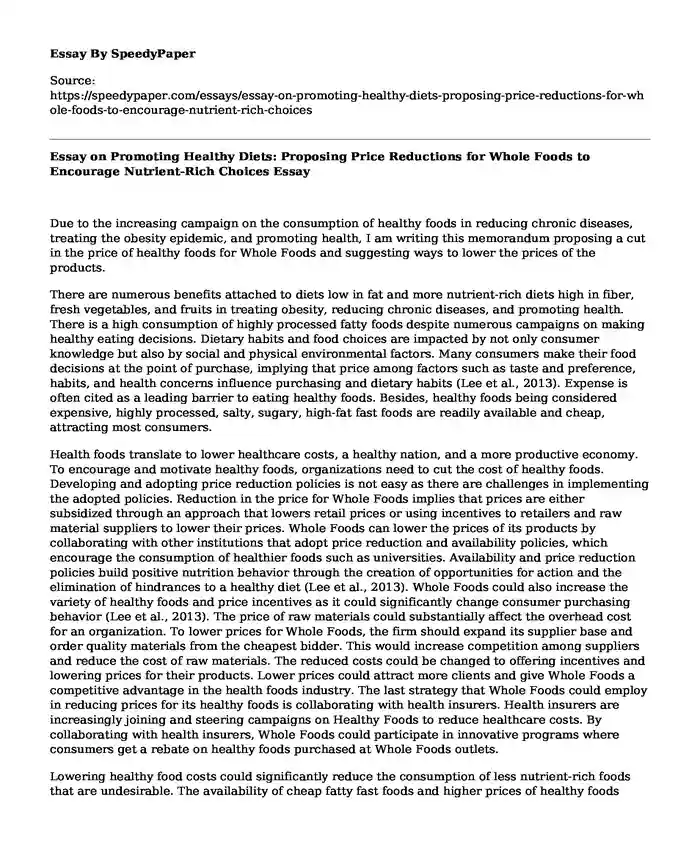Due to the increasing campaign on the consumption of healthy foods in reducing chronic diseases, treating the obesity epidemic, and promoting health, I am writing this memorandum proposing a cut in the price of healthy foods for Whole Foods and suggesting ways to lower the prices of the products.
There are numerous benefits attached to diets low in fat and more nutrient-rich diets high in fiber, fresh vegetables, and fruits in treating obesity, reducing chronic diseases, and promoting health. There is a high consumption of highly processed fatty foods despite numerous campaigns on making healthy eating decisions. Dietary habits and food choices are impacted by not only consumer knowledge but also by social and physical environmental factors. Many consumers make their food decisions at the point of purchase, implying that price among factors such as taste and preference, habits, and health concerns influence purchasing and dietary habits (Lee et al., 2013). Expense is often cited as a leading barrier to eating healthy foods. Besides, healthy foods being considered expensive, highly processed, salty, sugary, high-fat fast foods are readily available and cheap, attracting most consumers.
Health foods translate to lower healthcare costs, a healthy nation, and a more productive economy. To encourage and motivate healthy foods, organizations need to cut the cost of healthy foods. Developing and adopting price reduction policies is not easy as there are challenges in implementing the adopted policies. Reduction in the price for Whole Foods implies that prices are either subsidized through an approach that lowers retail prices or using incentives to retailers and raw material suppliers to lower their prices. Whole Foods can lower the prices of its products by collaborating with other institutions that adopt price reduction and availability policies, which encourage the consumption of healthier foods such as universities. Availability and price reduction policies build positive nutrition behavior through the creation of opportunities for action and the elimination of hindrances to a healthy diet (Lee et al., 2013). Whole Foods could also increase the variety of healthy foods and price incentives as it could significantly change consumer purchasing behavior (Lee et al., 2013). The price of raw materials could substantially affect the overhead cost for an organization. To lower prices for Whole Foods, the firm should expand its supplier base and order quality materials from the cheapest bidder. This would increase competition among suppliers and reduce the cost of raw materials. The reduced costs could be changed to offering incentives and lowering prices for their products. Lower prices could attract more clients and give Whole Foods a competitive advantage in the health foods industry. The last strategy that Whole Foods could employ in reducing prices for its healthy foods is collaborating with health insurers. Health insurers are increasingly joining and steering campaigns on Healthy Foods to reduce healthcare costs. By collaborating with health insurers, Whole Foods could participate in innovative programs where consumers get a rebate on healthy foods purchased at Whole Foods outlets.
Lowering healthy food costs could significantly reduce the consumption of less nutrient-rich foods that are undesirable. The availability of cheap fatty fast foods and higher prices of healthy foods discourage the consumption of healthy foods. As such, healthy food consumption pattern is significantly affected by price sensitivity. Price changes can alter consumption behavior by motivating people to make informed dietary decisions. This information is crucial in influencing the nutritional wellbeing of a population. Price incentives, initiatives to increase availability, and long-term innovative campaigns on healthy foods could support better food quality and promote health. Information on lowered prices for healthy foods is important to the general audience in influencing their dietary behavior, understanding the importance of healthy foods, and hindrances to purchasing and consuming healthy foods. This information will impact and promote healthy foods.
Reference
Lee, A., Mhurchu, C. N., Sacks, G., Swinburn, B., Snowdon, W., & Vandevijvere, S. (2013). Monitoring the price and affordability of foods and diets globally. Obesity Reviews, 14, 82-95. DOI:10.1111/obr.12078
Cite this page
Essay on Promoting Healthy Diets: Proposing Price Reductions for Whole Foods to Encourage Nutrient-Rich Choices. (2023, Nov 11). Retrieved from https://speedypaper.net/essays/essay-on-promoting-healthy-diets-proposing-price-reductions-for-whole-foods-to-encourage-nutrient-rich-choices
Request Removal
If you are the original author of this essay and no longer wish to have it published on the SpeedyPaper website, please click below to request its removal:
- Free Essay on Management Issues at the McDonald's Chain of Restaurants
- Free Essay on Laboratory Information Management Systems
- Free Paper: Observational Research Report on McDonald's Restaurants
- Critical Review of PTSD. Essay Example
- Weight Loss Surgery: 5 Types and Benefits - Essay Sample
- Essay Sample on Covid-19 Experience
- Technology and Healthcare Costs - Essay Sample
Popular categories





